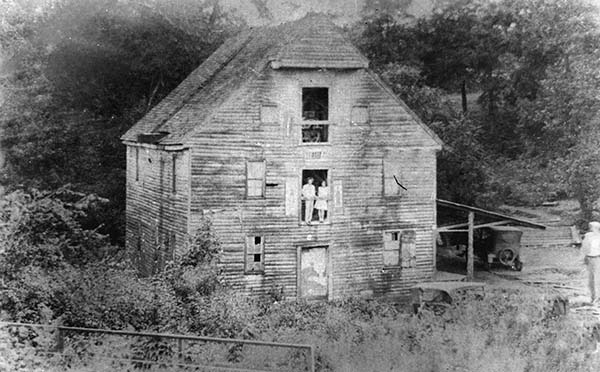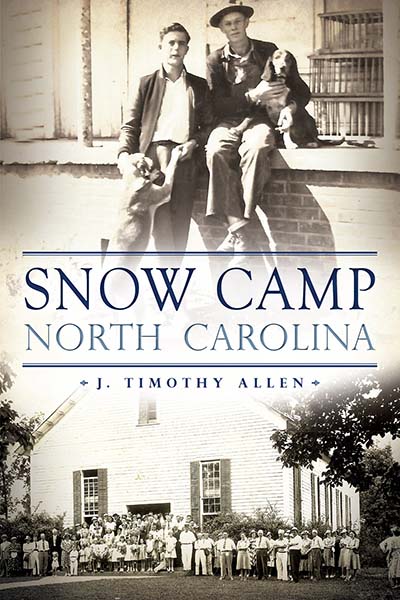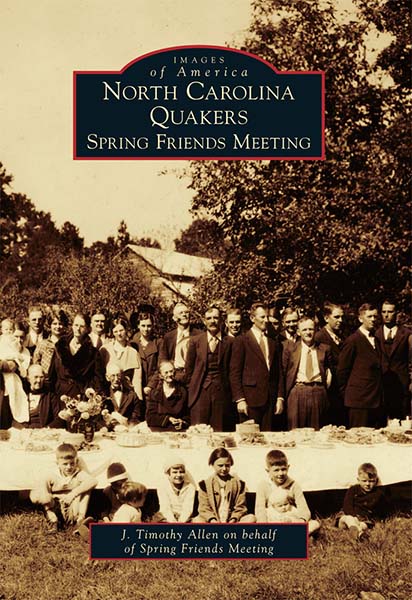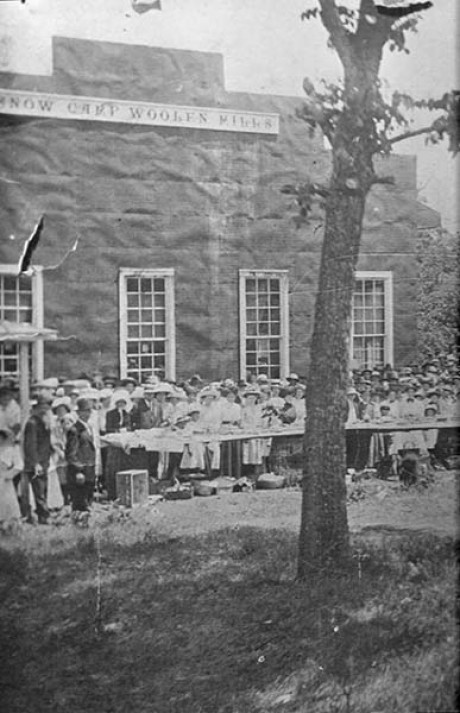A strong & creative work ethic
The industrious Quakers of Snow Camp have been making their mark since the mid 1700s
By by J. Timothy AllenThe small Piedmont community of Snow Camp in Alamance County is known for its Quaker heritage. Society of Friends members from Pennsylvania and Virginia settled there around 1749, quickly building Cane Creek Quaker Meeting in 1751 which then gave birth to five other Friends Meetings: Deep River, Spring, New Garden, Centre and Rocky River. The rich religious heritage of the Friends is still recalled in the two shows at the Snow Camp Outdoor Theatre: "The Sword of Peace," which is about Quaker resistance to the Revolutionary War, and the "Pathway to Freedom," which relates the role of Quakers in the Underground Railroad.
The theater itself is the realization of a dream of Quakers Ed and Lorraine Griffin as well as the hard work of James Wilson and his family.
What is not so well known about the Snow Camp Quakers is their penchant for industry. There are few signs left of the manufacturing and entrepreneurial side of Snow Camp today. While it is expected that farm tasks such as raising mules, making pottery, tanning, logging, carding and weaving yarn, blacksmithing and others, including ferry services, might become part-time or even full-time professions, a look back into the past reveals a strong and creative work ethic that led to many innovative ideas and enduring companies.
As businesses were formed in the 1800s, goods were shipped to and brought in from various towns in and out of state. Dirt roads were dusty when dry and muddy when wet. A more dependable route was needed to benefit commerce. In the 1840s several people in Snow Camp, including Quakers Joseph, Thomas, Gurney and Hugh Dixon, constructed a plank road from Snow Camp to Fayetteville.
The old buildings now only exist in memories and photographs but for roughly 150 years Snow Camp was a bustling industrial center.

Thomas Lindley and Hugh Laughlin built this mill in 1755 on Cane Creek. This picture was taken around 1920 by Ralph Johnson and then reproduced by C.M. Newlin of Snow Camp. The mill has been restored, and its large stone, water-powered wheels grind meal and flour for customers today.
Mills
Simon Dixon was one of the original Quaker settlers in Snow Camp. When he arrived from Pennsylvania he brought with him two millstones that were soon grinding away in his new mill on Cane Creek. He was also known for having a "rock house" in the area rather than a log cabin like others. His mill ran until the 1930s.
The longest running mill in Snow Camp is Lindley Mill. Begun in 1755 by Thomas Lindley, it remains at its original location just off Greensboro-Chapel Hill Road on Lindley Mill Road and features organic flour. While it left the Lindley family briefly in the 1800s, the ninth generation of Lindleys now own and operate the mill.
The Cane Creek area has been the home of many manufacturing facilities throughout the centuries. Cane Creek Cotton Mill was built in1835. A thousand investors bought stock; Jesse Workman and Peter Stout helped build the dam for the mill. The mill was later bought out and named Holman Mill. It was closed and reopened several times producing various products including cloth and flour until 1937.
Snow Camp Woolen Mill was built by Hugh and Thomas Dixon in 1886. Many locals raised sheep and sold wool to the mill. Others made lye soap and some wove for the mill. After the mill burned it was turned into Snow Camp Roller Mill (or Snow Camp Milling Company) by Harris McVey and Charlie Durham and it ran until 1974 producing cornmeal and livestock feed.
Stores
Several small stores supplied the residents with necessities. Most stores in those days sold only a few items, while some offered multiple services such as post office, blacksmith and grave markers. Many products were ordered from catalogues. Randolph Coble ran a local store in the late 1800s that was later taken over by son Claude Coble. Hayes Thompson also owned a store around 1900. His son Paul opened a garage in 1931. William Patterson Stout was given a tannery business when he married local Jennie Dixon; he sold these goods in a store a few miles north of Snow Camp.
Allens
Industry was a family matter when it came to John Allen III and his wife Rachel. Their late 1700s two-story home (that is now located at the Alamance Battleground State Historic Site outside of Burlington) held 12 children as well as Rachel's collection of potions and herbs for her itinerant medical practice and pharmacy. John wore many hats: farmer, teacher, craftsman and lawyer. He also operated a small store from the back of his house.
The Snow Camp Allens operated a small foundry which was then updated by Temple Unthank just before the Civil War. It proved unprofitable but Quaker William Henley and other men re-organized Fairmount Foundry after the Civil War. Henley, who patented the turbine wheel, also constructed many other mills in the state.
Education
Quakers were quite creative when it came to education as well. Cane Creek Friends Meeting members were leaders in Sylvan of the Grove Academy, now Sylvan Elementary School. When a new building was constructed in 1912, brick fired from local clay and wood from nearby trees was milled for construction. Parents even bought chairs for their own children. Just a few years later George Beale operated the first school bus in the state for Sylvan. Many of the pastors of Cane Creek Meeting taught at Sylvan School. Jane Hammer and her husband, Isaac, had the foresight to endow Sylvan School, and funds from that endowment are still used today for the students.
Vision
Innovation was also seen in Cane Creek Friends Meeting. Long before power came to the area the meeting house was lit by batteries.


Eula Louise Dixon was a visionary in Snow Camp. The second female graduate of North Carolina State College (now NC State University) was probably an Extension agent in the area and she managed her own farm. A president of Snow Camp Woolen Mill, she saw the future was in the telephone. She was instrumental in Snow Camp's first switchboard. When the building burned in 1914 several Quaker men quickly set up the publicly traded Snow Camp Telephone Company.
About the Author
Tim Allen lives in Snow Camp and is the author of “Snow Camp, North Carolina” (History Press, 2013), and “North Carolina Quakers: Spring Friends Meeting” (Arcadia Publishing, 2011).-
Share this story:




Comments (3)
Denise Smith |
November 14, 2019 |
reply
Nic Ingle |
October 25, 2020 |
reply
Barbara Luetke |
May 22, 2021 |
reply